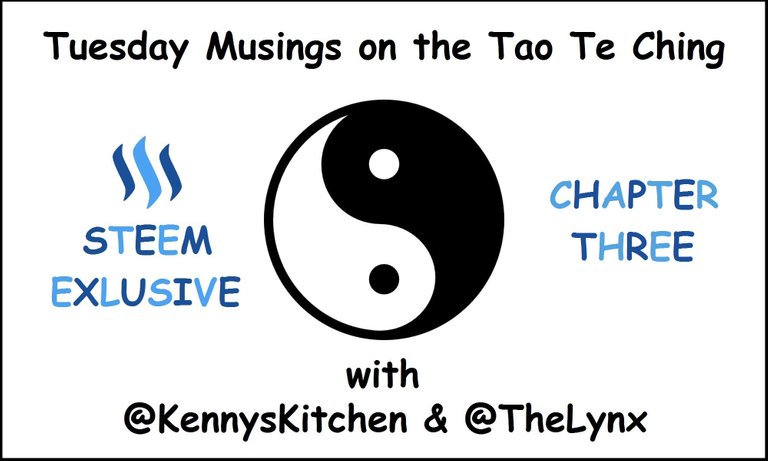
Welcome to the third installment of Tuesday Musings on the Tao Te Ching, with a weekly series where my partner @TheLynx & I will be taking a look at the Tao Te Ching (pronounced "Dao/Dow De/Day Jing"), one chapter at a time. This week we're being joined by my good friend Luis of @EmancipatedHuman, which is so awesome!!
The Tao Te Ching was written by Laozi/Lao Tzu at least 2400 years ago. Although there are certainly a wide variety of texts and teachers that have come together to form the basis of modern Taoism, the original Tao Te Ching is central. It's been translated hundreds of times, and it is certainly one of the most influential spiritual texts of modern humanity.
To be perfectly clear, neither of us is an "expert" on the Tao, or even consider ourselves Taoist, and we are not trying to come across as any sort of authority figures. Just two humans meditating on the text and sharing what comes up for us, hopefully starting a conversation with you folks!
The most difficult part of setting this up is picking which translation of the Tao Te Ching to use, since obviously it wasn't written in English, and we can't read classical (or any other version) of Chinese. We've finally settled on using just 9 different translations for each chapter. 7 of them (and the original Chinese) will be included as a screenshot (from 2 sites that each offer a variety), while the other two will be included as quotes in the text body of the posts.
- YellowBridge - Original Chinese & 3 translations:
- TranslationComparison - 4 translations:
- DC Lau (1964)
- Ursula K. Le Guin (1997)
Previous Chapters
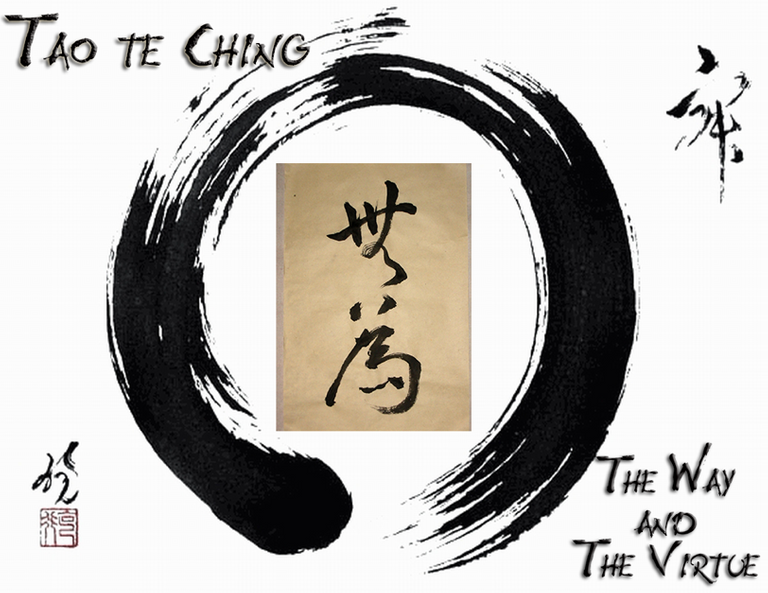
Chapter 3
Not to honor men of worth will keep the people from contention;
not to value goods which are hard to come by will keep them from theft;
not to display what is desirable will keep them from being unsettled of mind.Therefore in governing the people, the sage empties their minds but fills
their bellies, weakens their wills but strengthens their bones.
He always keeps them innocent of knowledge and free from desire, and ensures
that the clever never dare to act.Do that which consists in taking no action, and order will prevail.
Not praising the praiseworthy
keeps people uncompetitive.Not prizing rare treasures
keeps people from stealing.Not looking at the desirable
keeps the mind quiet.So the wise soul
governing people
would empty their minds,
fill their bellies,
weaken their wishes,
strengthen their bones,keep people unknowing,
unwanting,
keep the ones who do know
from doing anything.When you do not-doing,
nothing’s out of order.
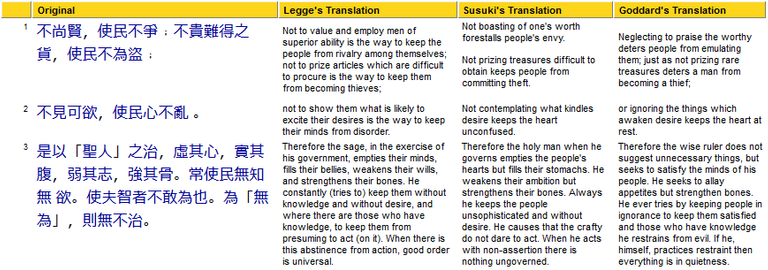
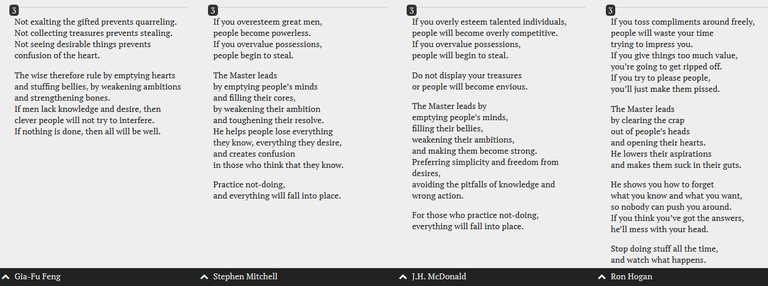
My Thoughts/Reflections/Insights
The first couple of lines here are quite interesting, as they vary quite greatly from translation to translation. Lau, Le Guin, Mitchell, and McDonald all seem to read it as something like "Don't praise people too much, because it creates unnecessary envy/competition, and don't put too much value onto belongings, because it leads to theft. These translations, to me, feel like a pretty pointed argument against hierarchy & materialism. Goddard's translation makes the first part seem like something we don't want to do (Neglecting to praise the worthy deters people from emulating them...), but that doesn't seem to line up with most of the others.
The next couple of lines also feel quite relevant to any conversation about "government", saying something along the lines of "Don't fill the people's minds (no propaganda), but fill their bellies. Don't create excess ambition (competitive systems), but strengthen their cores, their bodies. If the people do not hold false beliefs and stories (ideology), then charlatans & manipulators will find no purchase in their minds." Basically, to me this section is telling us to do exactly the opposite of what governments all around the world do, indoctrinating their victims through schools, media, and other mass propaganda.
The last stanza once again brings me back to the teachings of Abraham-Hicks, and the idea that "doing" is not what is important. By the time we get to doing, the important work (of finding alignment) is already long done. The physical world is really a manifestation, an unfolding, of what's already happened in the vibrational world. This brings in the concept of wu wei once again, effortless effort, and what many refer to as simply "being in the flow".
Thoughts/Reflections/Insights from @TheLynx
The basic message of chapter three seems to be that the way to cultivate political peace is to avoid things that give rise to greed and envy. All the forms of disorder, confusion, and unrest mentioned seem to originate from or be expressions of greed and/or envy, including theft, desire, competition, and even the acquisition of knowledge.
The question of whether thievery, competition, and the acquisition of knowledge always originate in greed or envy (or both) is an interesting one to me. Is it context dependent? Would this make the acquisition of knowledge and competition immoral, or simply unwise? And would this be true on an individual level, or only in the context of governance over others?
Stated another way, whose needs are served by peace and tranquility? Is tranquility ideal for those who are being ruled, or for the ruler, or both? The text doesn’t speak specifically to whether tranquility and peace are valuable for their own sake, or merely as a means to help a ruler remain in power. The use of the words “holy man”, “sage”, “wise ruler”, and “wise soul” could arguably to imply the former -- though it’s certainly possible that the author regarded holy wisdom as that which serves power, rather than the benefit of all.
In addition to political governance, the chapter has broad applications in everything from child rearing (which I suppose is a form of governance) to self management. On a personal level, I appreciate the wisdom in the reminder that “not contemplating what kindles desire keeps the heart unconfused” (Susuki). Averting the mind from objects of desire (people and ideas, as well as things) cultivates mental tranquility. The pull to dwell on things that stir up desire (a form of suffering, or at least unrest) is such a strange compulsion -- though one in which I have plenty of personal experience.
Where do greed and envy originate? Depending on the translation, the third(ish) line of chapter three places the origin of greed and envy in the appetites of either the heart or the mind, positing that an empty heart/mind leads to order, clarity (or lack of confusion), and rest.
So, chapter three presents this litmus test: if something leads to suffering or unrest, personally (?) or politically, it ought to be avoided. Striving, ambition, rivalry, and sophistication, whatever their benefits, lead to suffering and are therefore unwise. I’m left wondering whether the chapter intends to imply that tranquility is more important than the “progress” of a culture, if progress can be measured in excellence, achievement, acquisition of knowledge, or production of goods, because the trade off for these achievements is unrest, unhappiness, greed, envy, and confusion. The alternative would be that it doesn’t matter what is better for the culture, as long as the ruler maintains power.

Thoughts/Reflections/Insights from @EmancipatedHuman
This is certainly a chapter that leaves me scratching my head because it takes me to two places; one where I wholeheartedly agree and one where I either do not understand context or it seems incomplete.
Let us dissect the pieces and study them in some detail
“If you overly esteem talented individuals, people will become overly competitive.”
I used to believe, as a free market advocate, that competition was the way to create more value for society because the market decides who wins and they would end up getting the best deal possible.
Nowadays, I do not even agree that intentional competition is as healthy as it is portrayed.
This first phrase of chapter 3 let us realize that it is okay to definitely appreciate talented individuals and their output, but doing so in a very strong fashion will miss the mark by focusing on the individual instead of both the output AND the individual. Leaving people wishing they could be seen because the spotlight is mainly on a very few people since it is what is valued.
A true leader grows people around them and teaches them how to lead themselves and others. It is a maturity continuum that goes from “me” to “us” to “all of us.”
“If you overvalue possessions, people begin to steal.”
Here is where I start having some issues. But mainly, I think, because the difference between how wealth was generated before and how it is now. Before, to amaze great wealth tribes used to invade other tribes and obtain resources and goods. Nowadays, it is relatively easy in the information age to sell our knowledge without an actual product…
Going to what I think the author believes, if we prize certain items in a way that they become a status that separate us from other people and augments our inherent value in society, and we believe that it actually happens, it is possible that people will attempt to obtain those items for the sake of recognition.
“The Master leads by emptying people’s minds and filling their cores, by weakening their ambition and toughening their resolve.”
I can understand how this could be seen as a positive thing, especially when valuing items could create havoc in society. And we can definitely see it in our own country when people go into debt to get items that make them look rich to impress their peers and it ends up leaving them empty inside and broke.
However, in my mind, it is not “either, or” but “both, and.” People can definitely be nourished, nurtured, as well as helping them temper their ambition by not necessarily having the goal of riches in mind but service to others. Which funny enough, always brings back joy and financial gain.
“He helps people lose everything they know, everything they desire, and creates confusion in those who think that they know.”
As a mystic myself, I absolutely understand the value of losing myself and unlearning old patterns, especially those that are not useful. Many times, people go about their lives thinking they have things figured out when in reality they are just programmed with certain code like a computer that responds to some stimuli, and more often than not, they are unaware of this programming.
By really questioning our programming we truly begin to see life for what it is and we are then able to turn “auto pilot” of and live an intentional life with awareness and true choice.
“Practice not-doing, and everything will fall into place.”
This is definitely a puzzling concept to the western mentality. It does not mean not doing anything… it means working in conjunction with the universe. Not necessarily creating our existence from our lower desires but from the will of our higher self.
What this means is that when we do our awareness practices and we lose the old self and we achieve self-realization, we know who the real doer of things is and how we can connect with the state of FLOW. When we do this, life seems easier, the world seems bigger, our daily tasks bring more joy and although life continues to be challenging, the challenges are seen as opportunities to harness our will and learn about ourselves instead of seeing them as a bad day or as if the world is against us.
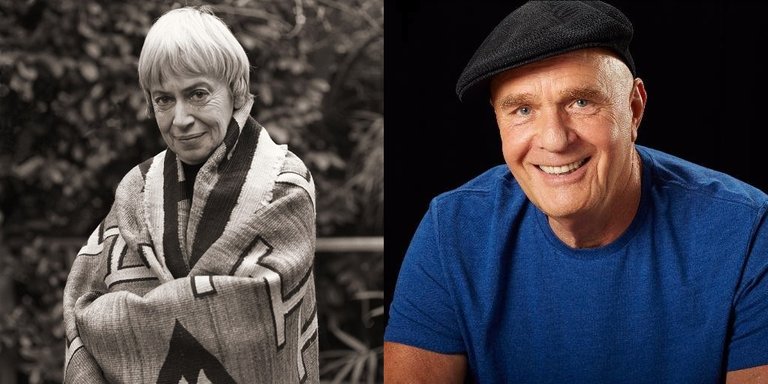
Thoughts/Reflections/Insights from Ursula K. Le Guin
After @TheLynx & I each sit with the chapter of the week and write our own reflections & insights, I'm going to include here the comments that Ursula added to her translation of the Tao. If you aren't familiar with Le Guin, I highly recommend reading any & all of her content that you can find :-) She's a wise, inspirational, curious, and delightful author of science fiction, fantasy, poetry, and much more!
Over and over Lao Tzu says wei wu wei: Do not do. Doing not-doing. To act without acting. Action by inaction. You do nothing yet it gets done...
It’s not a statement susceptible to logical interpretation, or even to a syntactical translation into English; but it’s a concept that transforms thought radically, that changes minds. The whole book is both an explanation and a demonstration of it.
Affirmation by Dr. Wayne Dyer
The final piece of our piece on each chapter of the Tao is an affirmation, written by Dr. Wayne Dyer, and featured in his book: Living the Wisdom of the Tao. Dyer was one of the foremost names in self-development, having published well over 30 books, as well as guided meditations, and many more useful tools for transformation.
I know that there
is no way to happiness.
Happiness is the way.

Join the conversation!
Here's the part where we hear from you! If you have anything that you want to add to the conversation, please hop down to the comments section. By reflecting & synthesizing together, we can all help move forward human consciousness, and that is a pretty fun thing!
I'm very excited to take this new step into my way of offering content, opening up my first fully collaborative project with my partner @TheLynx (who just started on STEEM, please head over and give her a follow), starting another weekly segment (Sunday Cinema Reflections), and making it one of my daily priorities to reply to all the comments my posts receive (besides spam of course).
Image Sources
YellowBridge Translations
TTC Translations
Mises
Le Guin
Dyer
Conversation

If you enjoyed this, you may enjoy some of these highlights of my blog:



I upvoted your post.
Best regards,
@Council
Posted using https://Steeming.com condenser site.
Upvoted.
Thank you for letting me be part of this <3
I've heard it said that even the Rothschilds adorned themselves with humble clothing when the economy went south. We've lost all good sense under the tutelage of Wall St. and their advertising agencies combined with the narcissism of the sports and entertainment complex; not to mention porn although we are in the great revealing.
I always liked the O.T. lamentations (there's not much I like about that book but that and the Jubilee)and the injunction to consider sackcloth, but I admit to being a pessimist:D
Hi @kennyskitchen!
Your post was upvoted by @steem-ua, new Steem dApp, using UserAuthority for algorithmic post curation!
Your UA account score is currently 6.335 which ranks you at #187 across all Steem accounts.
Your rank has not changed in the last three days.
In our last Algorithmic Curation Round, consisting of 298 contributions, your post is ranked at #20.
Evaluation of your UA score:
Feel free to join our @steem-ua Discord server
Nice collaboration! As not native-English speaker this was quite a study for me before I could understand. I'm glad you three broke the text down for me, it's fascinating to see what three different people can do with it. It's very informative! Thanks!
I would like to say something on the content as well, but that would take me another hour of studying your article or so. I just wanted to leave a comment anyway.